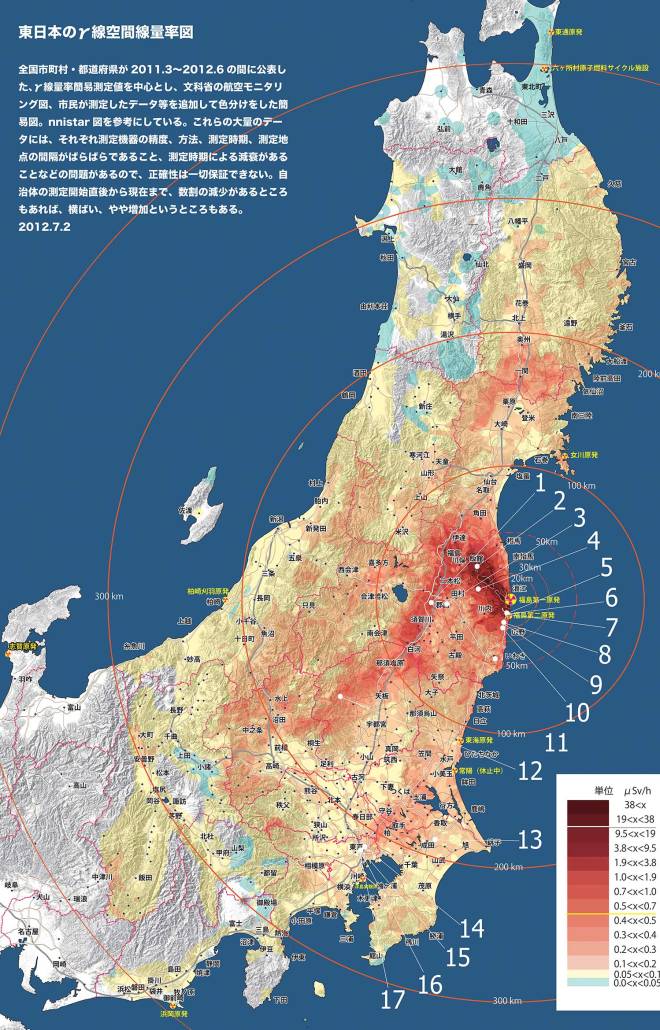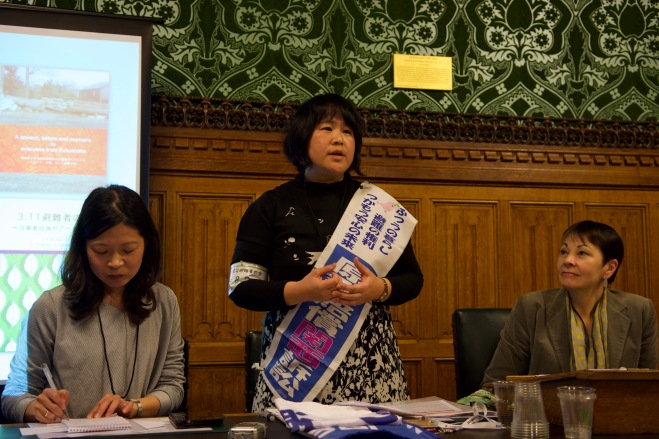Fukushima Mother Akiko Morimatsu[1] gave the following speech at the Remember Fukushima Parliamentary public meeting, in the House of Commons, Westminster, London, on 19 March 2019
Rough transcript:
“Thank you very much for having me today, I’m Akiko Morimatsu.
I am very honoured to speak here in the Houses of Parliament in Westminster. It’s been eight years and this place is far from Japan, but people are thinking about us and I am really thankful to all the people who have given us this opportunity. And I will talk about what we lost, what suffering we’ve had and what suffering the whole of humankind had to suffer.
These are my children [applause]. Meiyo, 11 years old and Meia, 8 years old.
After the Fukushima Daiichi disaster for two months I remained in Koriyama which is about 60 kilometres away from the Fukushima Daiichi nuclear power plant. In May, two months after the disaster, I moved to Osaka which is about 600km away from Fukushima with my two children, my beloved children.
It’s been eight years since we evacuated. The only reason I evacuated in order to protect me and my children and it’s about our health and our lives. At that time my children were several months old and three years old.
Immediately after the disaster there were a lot of parents and children who wanted to evacuate and there are still many parents and children who want to stay away from the disaster struck area. However during the last eight years virtually no policy or institution has been established in order to protect our lives. On the other hand the Japanese government is trying to eliminate the public support [in order] to promote the return of the people to Fukushima and for this policy a huge amount of money has been spent meanwhile housing subsidies and public support to the evacuees has been cut.
We the residents of Fukushima have been exposed to unnecessary radiation exposure. First the nuclear power plant exploded and that contaminated the air and the [radioactive] plume fell to the ground and that spread into the ground water and the water goes into the ocean and in that sense, just as Ian visualized, the Fukushima Daiichi disaster contaminated the whole Earth.
Of course the nuclear power disaster is an environmental disaster and it’s a matter of energy policy. However I myself regard the nuclear power disaster as something which directly concerns human life and health and it’s about our right to live a healthy life free of radiation exposure.
My personal experience was that at that time my daughter was only several months old and I had to drink the contaminated water and I had to breastfeed my daughter [2][3]. And my daughter didn’t have the choice to say “no.” She didn’t even have any notion of avoiding radiation exposure, she couldn’t understand that kind of notion. But my daughter and those other children were forced to be contaminated because of the actions of their parents.
To live free from radiation exposure, the right to live free from radiation exposure is one of the fundamental human rights that directly concerns our human life.
That right to live free from radiation exposure is intrinsic to every single person, even the babies who were just born, or if you are an older person who might end your life tomorrow: regardless of your sex, regardless of your family members, regardless of your background, we all need to have the right to avoid unnecessary radiation exposure and that’s the right of every single person in the world.
I’d like to talk about why I decided to evacuate. Before the disaster I already knew that in 1945 atomic bombs were dropped on Hiroshima and Nagasaki and from that I knew the word “Hibakusha.” Hibakusha means a person who has suffered radiation exposure. And because I knew that word I felt I had to leave this place.
It’s the same: the radiation exposure due to the atomic bomb or radiation exposure due to the seemingly peaceful uses of nuclear for energy purposes. They are all the same radiation exposure, so I say no more Hiroshima! No more Nagasaki! And then no more Fukushima!
This is the most important message I have from Fukushima, that it is not only the right of Japanese people but of people all over the world.
I believe that we can’t live with nuclear. We have learned a lot of lessons from Hiroshima and Nagasaki and we as Fukushima victims we need to continue to witness, we have the responsibility to tell the suffering to people and to the next generation.
The preamble to the constitution of Japan states that all people in the world have the right to live in peace, free from fear and want. And I would really like to pursue a life in peace, free from fear of radiation exposure and want. And I’d really like to stress that we cannot live with nuclear. And thank you very much for inviting me here.”
Akiko’s speech in the UN Human Rights Council last year:
“My name is Akiko Morimatsu. I’m here with other evacuees and mothers together with Greenpeace. I evacuated from the Fukushima disaster with my two children in May 2011. Shortly after the accident radiation contamination spread. We were repeatedly, unnecessarily exposed to unannounced radiation. The air, water and soil became severely contaminated. I had no choice but to drink the contaminated water and to breastfeed my baby. To enjoy health, free from radiation exposure is a fundamental principle. The Japanese constitution states “we recognize that all peoples of the world have the right to live in peace free from fear and want. However the Japanese government has implemented almost no policies to protect its citizens. Furthermore the government is focusing on a policy to force people to return to highly contaminated areas. I call on the Japanese government to immediately fully adopt and implement the recommendations of the UN Human Rights Council. I thank the UN member states for defending the rights of residents in Japan. Please help us protect people in Fukushima and East Japan, especially vulnerablechildren from further radiation exposure. Thank you.”
[1] Akiko Morimatsu, Fukushima mother who evacuated to Osaka with her two young children; leading light in the Japanese anti-nuclear movement & campaigning on behalf of the victims of the Fukushima Daiichi nuclear disaster: in March 2018 Akiko appeared in front of the UNHRC (United Nations Human Rights Council) to speak on behalf of the victims of the Fukushima Daiichi nuclear disaster, key member of Osaka-based “Thanks & Dream The Great Eastern Japan Earthquake & Nuclear Evacuee Association” http://sandori2014.blog.fc2.com/blog-entry-2062.html;
[2] The government did not warn the residents of Koriyama that their tap water might be contaminated with radioactivity from Fukushima Daiichi nuclear power plant; some Koriyama residents only became suspicious that it might be when the government advised residents of further away Tokyo to avoid feeding their infants and babies with tap water due to contamination. Tokyo lies some 230km away from Fukushima Daiichi nuclear power plant while Koriyama lies only some 60km away.

“Tokyo Tap Water Not Safe For Infants”:
“Fukushima Radiation Found In Tap Water Around Japan”:
http://www.simplyinfo.org/?p=14751
Table: Radioactivity from Fukushima Daiichi nuclear power plant measured in tap water in Tokyo and several other prefectures in July – September 2015: https://radioactivity.nsr.go.jp/en/contents/11000/10416/24/194_20151030.pdf
[3] Radioactivity can concentrate in breast milk: “The Transfer of Drugs and Other Chemicals Into Human Milk,” page 75, table 3:
https://massbreastfeeding.org/wp-content/uploads/2013/06/resourceGuide.pdf
And: “Drug Entry Into Human Milk”:
“In general, the lower the molecular weight of a medication, the more likely it is to penetrate into human milk, simply because diffusion through the alveolar epithelial cell is much easier. Medications with molecular weights less than 300* are considered smaller and will tend to penetrate to milk in higher concentrations than those with higher molecular weights.”
* the most common radioactive elements in the fallout from Fukushima Daiichi nuclear power plant have molecular weights of less than 300 e.g Iodine-131, Cesium-134/137, Strontium-90, Plutonium-239, Uranium-235
https://www.infantrisk.com/content/drug-entry-human-milk

